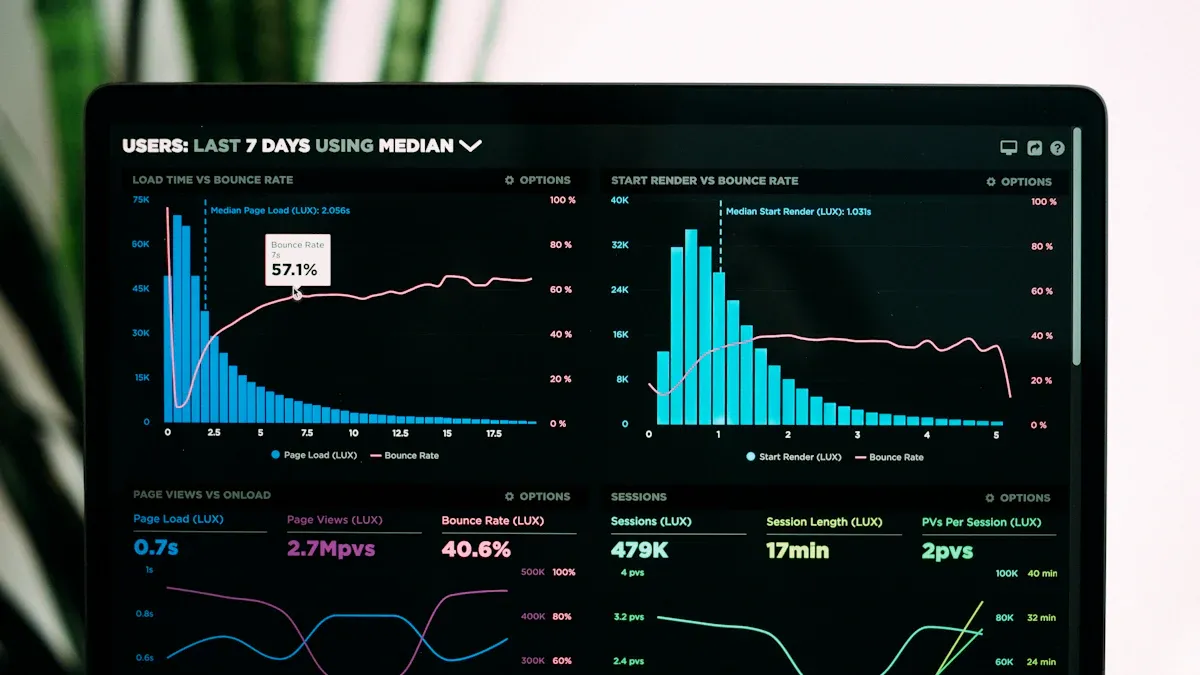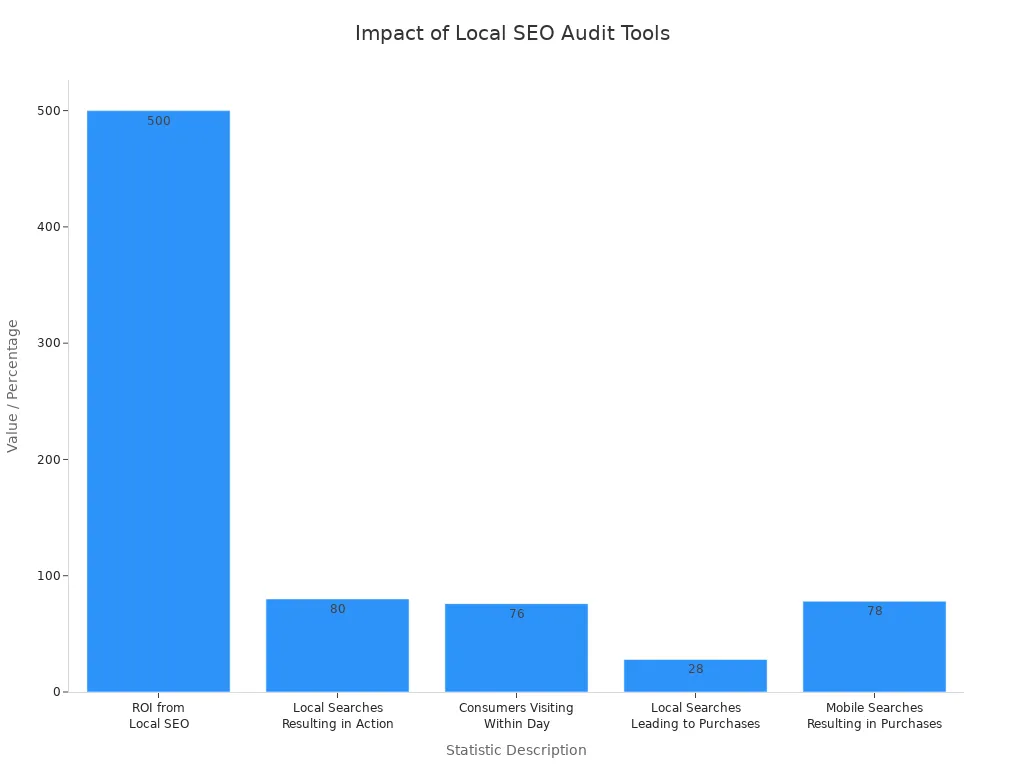Improve Client Results with Local SEO Audit Tools

You want your local business to stand out, right? Local SEO audit tools help you spot problems fast, track your progress, and boost your local presence. When you use the right tools and strategies, you see better rankings and more visibility in local search. Check out the numbers:
| Statistic Description | Value / Percentage |
|---|---|
| ROI from Local SEO Campaigns | 500% return on investment |
| Local Searches Resulting in Action | 80% |
| Consumers Visiting Business Within Day | 76% |
| Local Searches Leading to Purchases | 28% |
| Mobile Searches Resulting in Purchases | 78% |

Systematic local SEO audits transform outcomes for local businesses by improving google business profile details, driving more local search traffic, and helping you grow.
Local SEO Audit Benefits
Identify Issues
You want your local business to show up when people search nearby, right? A local SEO audit helps you spot problems that keep you hidden. Many local businesses have issues like wrong Google Business Profile details, duplicate listings, or missing citations. Sometimes, your business hours are wrong, or your phone number is missing. You might see low engagement or bad reviews. These problems are common, but you can fix them fast with the right tools.
- Local SEO audits reveal things like poor keyword targeting, slow websites, and toxic backlinks.
- You get actionable data, such as which days bring the most searches or which services are popular.
- Fixing these issues boosts your local search visibility and helps you connect with more customers.
Track Progress
Once you fix problems, you need to see if your changes work. Tracking progress is easy with local SEO tools. You can watch your rankings climb and see more people visit your website.
Tip: Use tools like Google Search Console, SEOptimer, or Local Falcon to track local search rankings and website traffic.
Check your Google Business Profile insights to see how many calls or messages you get. Look at your reviews and see if they improve.
- Track metrics like local search rankings, website traffic, customer reviews, and conversion rates.
- Regular tracking shows if your local SEO strategy brings more leads and sales.
- You can measure ROI by counting how many calls or visits come from local search.
Optimize Local Presence
You want your local business to stand out in local search results. Local SEO audits help you update your listings, fix NAP data, and respond to reviews.
- Update business hours, add photos, and complete your profiles.
- Make sure your citations match across all directories.
- Respond to reviews and ask happy customers to leave feedback.
- Use local keyword research to target what people search for in your area.
When you optimize your local presence, you send strong signals to Google. Your rankings improve, and your local visibility grows. Businesses that fix issues and keep their information fresh see more walk-ins and online bookings. For example, a restaurant updated its hours and reviews after an audit and saw a 40% jump in reservations in just one month. Local SEO tools make local search optimization simple and effective.
What Is a Local SEO Audit?

Key Components
A local SEO audit checks how well your business shows up in local search results. You want to know if people nearby can find you online. This process looks at many parts of your online presence. Here’s what you should focus on:
- Review your Google Business Profile. Make sure your name, address, and phone number (NAP) are correct. Add photos and pick the right categories.
- Check your local citations. Your business info should match across all directories.
- Look at your website’s on-page SEO. Use local keywords in your titles, descriptions, and content.
- Manage your reviews. Respond to feedback and encourage happy customers to leave new reviews.
- Do a local seo analysis of your competitors. See what they do well and find ways to stand out.
- Research local keywords. Find out what people in your area search for.
- Analyze your backlinks. Get links from other local businesses or news sites.
- Test your website’s speed and mobile-friendliness. Most local searches happen on phones.
- Use schema markup. This helps search engines understand your business details.
Tip: A complete Google Business Profile can bring more visits and more customers. Don’t skip this step!
Why It Matters
You want your business to show up when people search for services near them. A local seo audit helps you find what’s working and what needs fixing. When you keep your business info accurate and your reviews positive, you build trust. Local SEO makes sure your business appears in front of people who are ready to buy.
- Local SEO audits boost your visibility in local search results. Most people pick businesses on the first page.
- About 28% of local searches lead to a purchase within a day. That’s a big chance for more sales.
- Local seo analysis helps you spot gaps and beat your competitors.
- Mobile searches are huge. Over half of local searches happen on phones or tablets.
- Consistent business info and good reviews make people trust you more.
A strong local SEO strategy brings more calls, visits, and sales. Regular audits help you stay ahead and grow your business in your community.
Comprehensive Local SEO Audit Process
A comprehensive local SEO audit gives you a clear roadmap to boost your local search rankings and grow your business. You want to know exactly where you stand and what steps will help you climb higher in local search results. Let’s break down each part of the process so you can see how it all fits together.
Google Business Profile
Start with a google business profile audit. Your profile acts as your digital storefront. You need accurate and updated info, regular profile updates, and active review management. When you optimize for local keywords, you improve your profile’s visibility in local search. Consistent NAP (Name, Address, Phone) details across your profile and other platforms build trust and help search algorithms rank you higher.
| Optimization Element | Impact on Local SEO and Business Performance |
|---|---|
| Accurate and Updated Info | Builds trust, improves local search rankings, and prevents misleading customers |
| Regular Profile Updates | Maintains relevance, increases customer engagement, and boosts search visibility |
| Customer Review Management | Enhances online reputation, increases local search rankings, and provides actionable feedback |
| Local Keyword Optimization | Improves profile visibility and relevance in local search results |
| NAP Consistency | Ensures trustworthiness and alignment across platforms, aiding search algorithms |
| Schema Markup Implementation | Enhances search engine understanding, leading to better visibility and richer results |
| Monitoring Local Search Performance | Enables data-driven strategy refinement and adaptation to consumer trends |
| Measuring Engagement Metrics | Provides insights into user behavior, helping optimize content and interaction |
| Prompt Response to Reviews | Builds customer trust and improves local SEO rankings |
Tip: Avoid inaccurate information by checking your business hours, contact details, and location often. Respond to reviews quickly to build trust and boost your local search rankings.
NAP Consistency
NAP consistency is a must for local SEO. You want your Name, Address, and Phone number to match everywhere online. Search engines look for this consistency to confirm your business is real and trustworthy. If your NAP data is inconsistent, you risk confusing customers and hurting your local search rankings. Studies show that businesses with reliable NAP details see up to 80% higher conversion rates and a 41% increase in local search visibility. Regularly audit your listings on directories like Google Business Profile, Yelp, and Facebook to keep your NAP details aligned.
- Consistent NAP acts as a trust signal to search engines, improving credibility and local search rankings.
- Inconsistent NAP details can lead to SEO penalties, reducing visibility and ranking.
- Case studies show local businesses improving their search rankings significantly after aligning their NAP data.
Reviews & Reputation
Online reviews analysis is a key part of your comprehensive local SEO audit. Google values review signals like volume, recency, sentiment, and your responses. You want to encourage positive reviews and respond to all feedback, even negative ones. When you handle negative reviews professionally, you show customers you care and sometimes even turn bad experiences into good ones. Reviews with local keywords help you rank for “near me” searches and boost your local pack ranking. Regularly monitor your reviews and use feedback to improve your services and local SEO rankings.
- Google prioritizes review signals such as volume, recency, sentiment, and business responses.
- Managing Google reviews actively by setting alerts, tagging sentiment, and responding promptly improves credibility and SEO.
- Negative reviews, when handled professionally, can enhance trust and show business activity.
- Reviews mentioning local keywords help in "near me" and hyperlocal searches.
- Review content can be leveraged in marketing materials to boost SEO and customer trust.
Citations & Listings
A local citations audit checks your business information across all listings and directories. Citations help search engines verify your business legitimacy and location. You want accurate and consistent NAP details on major platforms like Google Business Profile, Bing Places, Apple Maps, Yelp, and Facebook. Both structured citations (in directories) and unstructured citations (mentions in blogs or news) add authority and improve your local search rankings. Industry-specific directories and local chambers of commerce listings give you extra local authority and help you stand out in your community.
- Citations and listings improve local SEO by ensuring consistent, accurate, and verifiable business information across platforms.
- Google Business Profile is the most important citation source, influencing appearance in Google Search and Maps, and increasing chances of being featured in the Local Pack.
- Other major citation sources include Yelp, Yellow Pages, Bing Places, Apple Maps, and Facebook, each trusted by search engines and contributing to visibility and credibility.
- Both structured citations (in directories) and unstructured citations (mentions in blogs, news, social media) contribute to local SEO authority.
- Maintaining accurate and consistent citations prevents ranking penalties caused by duplicate or inconsistent listings.
- Citations also build customer trust and expand online footprint, further supporting SEO efforts.
- Industry-specific directories and local chambers of commerce listings add niche and local authority, improving rankings and reputation.
Local Keyword Research
You need strong local keyword research to target what people actually search for in your area. Start with broad industry terms and narrow down to specific local phrases. Use geo-modified keywords like “Dallas dentist” or “Seattle bakery.” Balance local and broad keywords to maximize reach. Optimize your homepage, service pages, and contact page with primary and secondary keywords. Tools like Google Keyword Planner, SEMrush, and Ahrefs help you find the best keywords for your business. Analyze your competitors’ keywords to spot new opportunities and keep your strategy fresh.
- Balance local (geo-modified) and broad keywords to maximize reach without limiting visibility.
- Select primary target keywords for key pages with 2-3 secondary keywords to align with searcher intent.
- Optimize on-page SEO elements such as title tags, headings, content, and image alt text with local keywords.
- Structure site architecture to support keyword themes by creating location-based landing pages and service-specific pages.
- Analyze existing analytics and rankings to identify high-performing keywords and pages to preserve and optimize.
- Use tools like Google Keyword Planner, SEMrush, Moz, and Ahrefs to generate and analyze keyword ideas with geographic modifiers.
On-Page SEO
On-page SEO is the backbone of your local search optimization. You want your homepage and key pages to clearly state your business identity and location. Use local keywords in your meta tags, headings, and content. Add local business schema markup so search engines understand your business details. Make sure your website is mobile-friendly and loads fast, since most local searches happen on phones. Internal linking, descriptive image tags, and dedicated landing pages for each location help you rank higher in local search results.
- Optimized homepage content should clearly state the business identity and prominently feature the location to attract local searchers.
- Writing meta tags with local keywords helps listings stand out in search results and encourages clicks.
- Using local business schema markup informs search engines about key business details like name, address, phone, hours, and services.
- Ensuring the website is mobile-friendly is essential since most local searches happen on mobile devices; 88% of mobile local searches lead to a store visit within 24 hours.
- Fast page load speed and responsive design improve user experience and are ranking factors in local SEO.
- On-page SEO elements like header tags, internal linking, and descriptive image tags support better navigation and indexing.
Link Profile
A strong link profile boosts your local SEO rankings and helps you stand out in your community. You want links from locally relevant domains, community organizations, and local businesses. These links act as endorsements and increase your authority in local search. Tools like Search Atlas Site Explorer, Semrush, and Moz help you analyze your backlinks and find new opportunities. Local networking, sponsorships, and guest blogging are great ways to build local links. Even mentions without links (linkless citations) can improve your local prominence and brand recognition.
- Links are a significant ranking signal in local SEO, similar to general SEO.
- Inbound link authority is the most important factor, signaling site value to Google.
- Links from locally relevant domains carry more weight in local rankings.
- Quantity of high-authority links improves ranking potential.
- Link diversity, with links from various sources, is important for organic link profiles.
- Local networking groups and partnerships create backlink opportunities through joint marketing, referrals, and guest blogging.
- Local media outlets provide backlinks via press releases, interviews, and business spotlights.
- Local backlinks from community organizations and local businesses increase domain authority and visibility.
- Sponsorships of local events or charities often include backlinks from trusted local websites, boosting local search rankings.
Competitor Analysis
Competitor analysis is the final step in your comprehensive local SEO audit. You want to know who your real competitors are in local search and what they’re doing to rank higher. Track their google business profile audit, review their categories, reviews, and posting frequency. Analyze their website SEO, local citations audit, and link profile. Use location spoofing tools to simulate searches from different areas and see where you stand. Look for content gaps and opportunities to create unique, relevant content. Regular monitoring helps you adapt your strategy and stay ahead in local search rankings.
Note: Competitor analysis helps you focus your efforts where they matter most. By understanding what works for others, you can refine your own local SEO strategy and improve your local pack ranking.
Local SEO Tools for Audits

You want to make your local SEO audits easier and more effective, right? The right local seo tools help you find problems, track progress, and show results to your clients. Let’s look at the best local seo software and free local seo tools for each audit area.
Google Business Profile Tools
Start with google business profile tools. GMB Everywhere and BrightLocal let you check your profile details, track changes, and compare your business with competitors. These local seo tools show how customers find you and what actions they take. You get insights on NAP consistency, reviews, and photos. BrightLocal’s audit tool even benchmarks your profile against top competitors, so you know where to improve.
Citation & Listing Tools
Citation and listing management is key for local seo. Use BrightLocal, Yext, and Whitespark to fix NAP issues and manage your listings across directories. These local seo tools help you find duplicate listings and keep your business info accurate everywhere. BrightLocal gives you color-coded reports, while Yext automates updates for multi-location businesses. Whitespark is great for niche citations.
| Tool | Best For | Unique Feature |
|---|---|---|
| BrightLocal | Citation audits | Manual niche citation building |
| Yext | Multi-location updates | Automated NAP management |
| Whitespark | Niche citations | Concierge GMB management |
Review Management Tools
Review management tools help you boost your reputation. Birdeye, BrightLocal, and Moz Local let you collect reviews, respond fast, and track sentiment. These local seo tools aggregate reviews from many platforms and show you what customers think. Responding to reviews builds trust and improves your local rankings.
Keyword Research Tools
You need keyword research tools to find what people search for in your area. Google Keyword Planner, SEMrush, Ahrefs, and AnswerThePublic are popular free local seo tools. They show local keyword trends, competitor keywords, and content gaps. BrightLocal and Moz Local also track local keyword rankings and help you pick the best terms for your business.
On-Page & Technical Tools
On-page and technical local seo tools keep your website healthy. Use Google Search Console, PageSpeed Insights, and Screaming Frog to check site speed, mobile usability, and crawl errors. SEOptimer and Insites are free local seo tools that scan your site for SEO issues and give easy-to-follow reports.
Link Analysis Tools
Link analysis tools like Semrush, Ahrefs, and Search Atlas help you find good backlinks and remove toxic ones. These local seo tools show you where your competitors get links and help you build your own. BrightLocal also tracks local citations and backlinks, making it a strong local seo software choice.
Competitor Tools
Competitor tools let you see what others do well. Semrush Local, BrightLocal, and AgencyAnalytics compare your rankings, reviews, and keywords with top competitors. These free local seo tools automate reporting and show you where to focus your efforts. You get side-by-side comparisons and clear action steps.
Tip: Try different free local seo tools to see which ones fit your workflow. Many offer free trials or basic versions so you can test before you buy.
Using Audit Results
Prioritize Actions
You just finished your audit. Now, what should you do first? Start by sorting your tasks using a simple Fix Now / Monitor / Explore system:
- Fix Now: Tackle urgent problems that hurt your local search rankings. These include wrong business categories, broken links, old NAP info, or reviews you haven’t answered in over 60 days.
- Monitor: Keep an eye on things like how fast you get new reviews, if your citations show up, and if your mobile site works well. Watch your grid rankings to see if you move up or down.
- Explore: Look for ways to grow. Try making new location pages, getting more local links, or posting videos for special seasons.
Tip: Assign each task to the right person. For example, your SEO specialist can handle your Google Business Profile, while your customer service team can reply to reviews.
Implement Changes
Once you know what to fix, it’s time to act. Update your business info everywhere online. Make sure your NAP details match on every site. Respond to all reviews, both good and bad. Add new photos and posts to your Google Business Profile. Create fresh content with local keywords. Build links from other local businesses or groups. These steps help you climb higher in local search rankings and get noticed by more people in your area.
Set up monthly check-ins with your team. Use shared dashboards or reports to track your progress. This keeps everyone focused and helps you spot new issues before they become big problems.
Report to Clients
Clients want to see results. Show them clear reports with easy-to-read charts and tables. Highlight wins, like better local search rankings, more reviews, or higher website visits. Use a table to show before-and-after numbers:
| Metric | Before Audit | After Changes |
|---|---|---|
| Local Search Ranking | #12 | #4 |
| Monthly Reviews | 5 | 18 |
| Website Visits | 200 | 450 |
Note: Regular updates build trust. When clients see steady progress, they feel confident in your local seo work.
Local SEO Audit Best Practices
Schedule Regular Audits
You want your business to stay ahead in local search. Regular audits help you spot new problems before they hurt your rankings. Set a schedule that works for you. Many businesses check their local seo every quarter. Some do it every month. Pick a routine and stick with it. This way, you catch errors early and keep your information fresh.
Tip: Put audit dates on your calendar. Reminders help you stay on track and never miss a checkup.
Customize for Clients
Every business is different. You should tailor your local seo audits to fit each client’s needs. A restaurant might need more review management. A law office may focus on citations. Ask your clients about their goals. Use their feedback to shape your local search strategy. When you customize your approach, you show clients you care about their success.
- Make a checklist for each client.
- Focus on what matters most to their business.
- Share results in a way that makes sense to them.
Avoid Common Mistakes
Mistakes can slow down your progress. Watch out for these common errors:
- Ignoring NAP consistency. Always check your name, address, and phone number.
- Forgetting to update business hours or photos.
- Not responding to reviews, both good and bad.
- Using the same keywords everywhere. Mix it up to reach more people.
- Skipping mobile checks. Most people search on their phones.
Note: A strong local search strategy means you fix mistakes fast and keep improving.
You want your business to keep growing, right? Regular audits help you stay visible and trusted in your area. When you check your NAP details, manage reviews, and update your Google Business Profile, you build trust and boost your rankings.
- Audits let you spot problems fast and make smart changes.
- Tracking website traffic and reviews shows what works.
- Working with community partners and setting clear goals keeps your business moving forward.
Start using these tools and steps today. You’ll see better results and happier clients.
FAQ
What is a local SEO audit?
A local SEO audit checks how well your business shows up in local search. You look at your Google Business Profile, website, reviews, and listings. You find problems and fix them to get better results.
How often should you run a local SEO audit?
You should run a local SEO audit every quarter. Some businesses do it monthly. Regular checks help you catch errors early and keep your business info fresh.
Tip: Put audit dates on your calendar so you never forget!
Which local SEO tools are free to use?
You can try these free tools:
- Google Search Console
- Google Keyword Planner
- PageSpeed Insights
- SEOptimer (basic scan)
These tools help you spot issues and track your progress.
Can local SEO audits help small businesses?
Yes! Local SEO audits help small businesses show up in local searches. You fix mistakes, improve your online reputation, and attract more customers. Even small changes can make a big difference.
| Benefit | Result |
|---|---|
| More visibility | More customers |
| Better reviews | Higher trust |
See Also
Understanding The Value Of SEO Audits For Businesses
How To Use SEO Writing Tools To Boost Rankings
Step-By-Step SEO Audit Guide To Optimize Your Site

